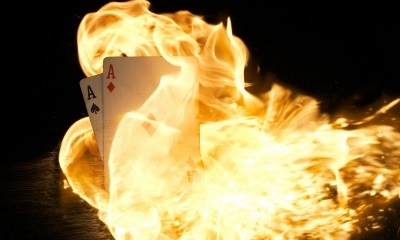|
 "Faint
heart never won fair lady." "Faint
heart never won fair lady."
-- Miguel de Cervantes
What is the most reliable tell in poker? I believe it is: Any player who says, "Iím a really good poker player"... very likely is
not. "Really good poker players" do not need to go around (seriously) telling others what good players they are. Really good poker
players just go ahead and show what they are made of, hand after hand, day in and day out. Just like the way to prove you are "a man"
is not to go around whining and crying about what ďa manĒ you are, the way to be a great poker player is simply to "be" a great poker
player, regardless of the circumstances.
Self-delusion is not merely a major reason many players lose
playing poker; it is a huge reason why many players do much worse than their potential. This differential between delusional skill-level and
real skill-level can mean the difference between a player who should be a small winner and is instead a moderate loser, or it can relate to
a player who is a moderate winner who should be an enormous one.
Some otherwise solid poker players curse themselves by recognizing they are excellent players, perhaps the best player in the room,
but then not recognizing that this only counts for so much. Much of what it takes to win at poker comes from merely surviving at
poker. If you arenít in the game, you canít win. If you canít take full advantage of every opportunity that presents itself, you
become less of a player. If this solid player sits down in a game where he is hopelessly
under-bankrolled, he transforms himself into a much weaker player.
An adequately bankrolled decent player will outperform a poorly bankrolled excellent player. Still, you see it all the time, fine players
digging their under-bankrolled fingers into the felt of a table they have no business being at. By deluding themselves into thinking that since
they are so good that they belong in this game, and actually can afford this game, these players make themselves much less than they truly should be.
Of course, a far more common delusion is that of a player who plays fairly well when playing his best, which may even be most of the time, but stinks
to high heaven when facing a string of bad luck. This player is operating under an extreme delusion if he thinks he is a pretty good poker player.
If nine times out of ten he plays at an 87 level (on a scale of 1 to 100), but one out of ten times he plays at a 17 level, this player is living
in a fantasy world if he judges himself an 87, or even an 80, or even a 60.
Most players donít do better at poker because they play incredibly poorly when having bad luck. The worst time to play poorly is when
you're having bad luck! But it is a rare thing to see a player working hard to play his best at the times he is running the worst --
even though this is the time you most need all your skills!
I believe the true nature of a playerís skills
are on display when the player is getting his teeth kicked in. And, this is the time when winning players make their most important
poker profit. Whatís that you say, profit when you are losing? Absolutely. Money not lost spends the same as money won. Money not lost
earns interest and dividends and has implied value just like money won does.
"Really good poker players" lose three racks of chips when others would lose four. Really good poker players take a beating from
opponents sometimes, but donít beat the tar out of themselves on top of it. Really good poker players donít cry about how good they
are. Instead they live to fight another day, even on the bleakest of days.
In Don Quixote, Cervantes said a faint heart
never won a fair lady. Courage and perseverance win the day. He also recognized the principles that go hand in hand with that notion when
he wrote: "What I say is, patience, and shuffle the cards."
See also Poker Ego,
Poker Empathy and
Poker Bullies |

